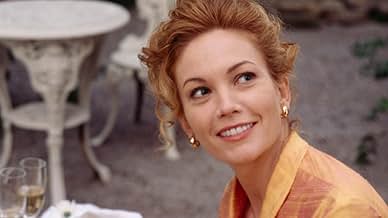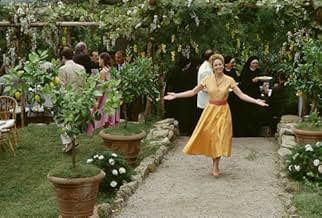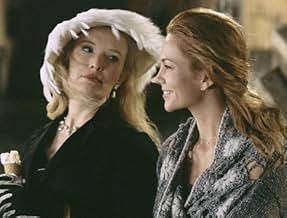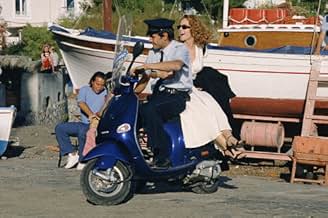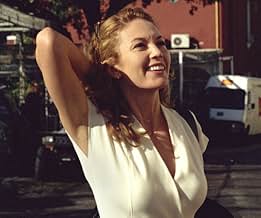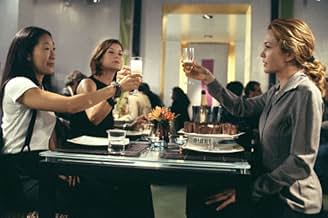Un écrivain achète sur un coup de tête une villa en Toscane dans le but de changer de vie.Un écrivain achète sur un coup de tête une villa en Toscane dans le but de changer de vie.Un écrivain achète sur un coup de tête une villa en Toscane dans le but de changer de vie.
- Réalisation
- Scénario
- Casting principal
- Récompenses
- 5 nominations au total
Giulia Louise Steigerwalt
- Chiara
- (as Giulia Steigerwalt)
Avis à la une
Diane Lane has always fascinated me, ever since I saw her debut movie, "A Little Romance," as a pre-teen. (She was in her early teens.) She has an elusive quality. She can look like a middle-aged, mom-next-door in one scene, and a girlish young woman in the next, seemingly without effort. Anyway, she is a consistently good actress, and, as Frances, is the one through whose eyes we see the story of "Under the Tuscan Sun." This is a delightful little movie, featuring lots of beautiful scenery, and containing some valuable messages: that love creates a family, and that oftentimes, our dreams come true in ways we would not have imagined. Sometimes, we have only to open our eyes to see the answers to our wishes right in front of us.
Admittedly, I was surprised. This isn't the type of movie that normally appeals to me, and yet I was really quite taken with it on a number of counts. It could be described as a very gentle movie (even mildly spiritual in some ways) full of sage advice about life and how to handle the disappointments that naturally appear, and - being somewhat stereotypically Italian in its presentation - it has a lot about love and romance and flirtatiousness in it. It even packs a bit of humour. Not a typical guy's movie, but still very pleasant viewing. What I particularly liked was the premise that essentially started the whole thing off. Frances (in a great performance by Diane Lane) discovers that her husband is having an affair, and they end up divorced - and, she being the primary bread winner - he gets the house and alimony. The lesson? When your life falls apart, move on to something completely different and start picking up the pieces. Frances buys a villa in Tuscany and restarts her life, with us watching. Her problems aren't solved. She seems to think that everything revolves around finding a man and romance, but - as her friend Martini points out near the end of the movie - she ends up with everything she wanted - just not in the way she expected to get it.
At times, it's a bit slow-paced, and it's not "exciting" in the way we think of the word, but it's got a quality that draws you into it. As far as the story is concerned, my only quibble might be the introduction of the character of "Ed" right at the end of the movie. Everything to that point had led to the understanding that Frances didn't need romance to be fulfilled; she had found her fulfillment with the people she had assembled around her, who had become a surrogate family. I suppose it's nice that she found someone to love, but the movie on the whole would have been more satisfying if it had ended with the gathering at the dinner table with all her friends - without Ed! That was an unsatisfying intrusion into an otherwise satisfying story. 7/10
At times, it's a bit slow-paced, and it's not "exciting" in the way we think of the word, but it's got a quality that draws you into it. As far as the story is concerned, my only quibble might be the introduction of the character of "Ed" right at the end of the movie. Everything to that point had led to the understanding that Frances didn't need romance to be fulfilled; she had found her fulfillment with the people she had assembled around her, who had become a surrogate family. I suppose it's nice that she found someone to love, but the movie on the whole would have been more satisfying if it had ended with the gathering at the dinner table with all her friends - without Ed! That was an unsatisfying intrusion into an otherwise satisfying story. 7/10
So, I've heard this film got the beating because it wasn't like the book? Ah, well, trust me; I'm a huge book-lover (and Harry Potter fan), so I can say that if I had read the book and was an immense fan, I probably wouldn't have liked the film if it had taken the basis out of the original story. I truly sympathize with those of you who disliked this film because it did not go with the book in some way or another. ;)
Although, since I love writing myself, I have a very wonderful relationship with this film and its delicious scenery, how the characters in it build in confidence, and the whimsical things that seem to be thrown in it artfully. Yes, there are some so-called "cliches", which is a word I hate using. We use that word to describe things that happen every day in our life, things that repeat themselves in storybooks and films and are heard so often that we are likely to vomit with expectancy of it all. But the thing that hit me about this film is that a lot of things happen that you really don't expect. The coming-of-age story has been told for ages, and will be expressed forever, with all its little tidbits of similar goings-on (serious situation happens, main character finds escape, love, broken heart, confusion..etc.). I don't think an entire genre of literature can deny its existence, now, can it? :)
The acting is superb, and it has a lot of light-hearted moments that lift it up. It's basically about accepting yourself before you can truly find "Mr.Right", and realizing that you shouldn't put the blame on yourself for every single thing in your life that happens, and about taking chances because life can have pros and cons. I even think that some men would like it. This film was very inspiring to me, and although I didn't see it in theaters, I left my couch feeling very creative and content, as if I wasn't the only one who got inspiration from the little things life seems to hand out.
Although, since I love writing myself, I have a very wonderful relationship with this film and its delicious scenery, how the characters in it build in confidence, and the whimsical things that seem to be thrown in it artfully. Yes, there are some so-called "cliches", which is a word I hate using. We use that word to describe things that happen every day in our life, things that repeat themselves in storybooks and films and are heard so often that we are likely to vomit with expectancy of it all. But the thing that hit me about this film is that a lot of things happen that you really don't expect. The coming-of-age story has been told for ages, and will be expressed forever, with all its little tidbits of similar goings-on (serious situation happens, main character finds escape, love, broken heart, confusion..etc.). I don't think an entire genre of literature can deny its existence, now, can it? :)
The acting is superb, and it has a lot of light-hearted moments that lift it up. It's basically about accepting yourself before you can truly find "Mr.Right", and realizing that you shouldn't put the blame on yourself for every single thing in your life that happens, and about taking chances because life can have pros and cons. I even think that some men would like it. This film was very inspiring to me, and although I didn't see it in theaters, I left my couch feeling very creative and content, as if I wasn't the only one who got inspiration from the little things life seems to hand out.
"Under the Tuscan Sun" is a polarizing film that seems to leave viewers (and critics) either in love with a story of growth and renewal or dismissive of its line. I'm firmly in the former camp.
Based so loosely on Frances Mayes's own account of her regeneration in beautiful Italy as to carry an end credit pronouncing that substantial fictionalization replaced key true details, writer and director Audrey Wells crafted a stunning vehicle for Diane Lane whose radiance projects from the screen powerfully. And in every scene.
Diane Lane, as the changed-from-the-memoir Frances, abandons San Francisco after her never shown cad husband divorces her, getting the house she once loved. Frances is a writer and literary critic. Why does she leave S.F.? Two of her closest friends give her a ticket for a gay bus tour of Italy and she jumps off the bus to look into a ramshackle old country house up for sale. Impetuosity? Definitely. Believable? Yes, actually.
Frances' new house isn't a handyman's special, it's a contractor's assurance of food on the table for a very long time. Frances adapts to the house and the locals with remarkable aplomb. Tuscany is sunny but its light fades before Frances's challenged but resilient commitment to not just restore a house but to create a home. The two aren't the same. I'm not sure how many male directors could so well create that reality.
Director Wells tells the story from a woman's heart but with a breadth of humor and drama that should appeal to anyone who wants to believe, or needs to hope, that there really is a light at the end of the tunnel of marital infidelity and dissolution.
Supporting Diane Lane is Sandra Oh as Patti, her closest friend. In relatively short scenes, Ms. Oh displays a lively and laconic grasp not only of her friend's life but also of her own which is not, as they say today, devoid of "issues."
Lindsay Duncan is Katharine, an older woman determined to hold on to her now fading attractiveness through a blend of humor, earthiness - and alcohol. Her character may be predictable but she's also fun.
Raoul Bova has garnered some press attention as handsome Marcello, the romantically available and affluent Italian. That's a character we've seen in many, many films and Bova delivers an expectedly satisfactory but hardly deep performance.
Yes, Diane Lane is beautiful but there is much more to her acting than a shining appearance. Her facial gestures, mirroring her emotions as they shift from moment to moment, are the product of extraordinary acting ability. And her character draws a powerful portrayal.
Credit also must go to cinematographer Geoffrey Simpson. Perhaps it would be impossible for a blind camera director to turn in anything but a gorgeous visage of rural and urban Italy but Simpson did do a marvelous job of making the locales come alive.
This is a film for adults, for people who can understand pain and the search for recovery and understand the difficulty of coming back from a space that once offered the mirage of safety and security.
I loved this film.
9/10.
Based so loosely on Frances Mayes's own account of her regeneration in beautiful Italy as to carry an end credit pronouncing that substantial fictionalization replaced key true details, writer and director Audrey Wells crafted a stunning vehicle for Diane Lane whose radiance projects from the screen powerfully. And in every scene.
Diane Lane, as the changed-from-the-memoir Frances, abandons San Francisco after her never shown cad husband divorces her, getting the house she once loved. Frances is a writer and literary critic. Why does she leave S.F.? Two of her closest friends give her a ticket for a gay bus tour of Italy and she jumps off the bus to look into a ramshackle old country house up for sale. Impetuosity? Definitely. Believable? Yes, actually.
Frances' new house isn't a handyman's special, it's a contractor's assurance of food on the table for a very long time. Frances adapts to the house and the locals with remarkable aplomb. Tuscany is sunny but its light fades before Frances's challenged but resilient commitment to not just restore a house but to create a home. The two aren't the same. I'm not sure how many male directors could so well create that reality.
Director Wells tells the story from a woman's heart but with a breadth of humor and drama that should appeal to anyone who wants to believe, or needs to hope, that there really is a light at the end of the tunnel of marital infidelity and dissolution.
Supporting Diane Lane is Sandra Oh as Patti, her closest friend. In relatively short scenes, Ms. Oh displays a lively and laconic grasp not only of her friend's life but also of her own which is not, as they say today, devoid of "issues."
Lindsay Duncan is Katharine, an older woman determined to hold on to her now fading attractiveness through a blend of humor, earthiness - and alcohol. Her character may be predictable but she's also fun.
Raoul Bova has garnered some press attention as handsome Marcello, the romantically available and affluent Italian. That's a character we've seen in many, many films and Bova delivers an expectedly satisfactory but hardly deep performance.
Yes, Diane Lane is beautiful but there is much more to her acting than a shining appearance. Her facial gestures, mirroring her emotions as they shift from moment to moment, are the product of extraordinary acting ability. And her character draws a powerful portrayal.
Credit also must go to cinematographer Geoffrey Simpson. Perhaps it would be impossible for a blind camera director to turn in anything but a gorgeous visage of rural and urban Italy but Simpson did do a marvelous job of making the locales come alive.
This is a film for adults, for people who can understand pain and the search for recovery and understand the difficulty of coming back from a space that once offered the mirage of safety and security.
I loved this film.
9/10.
Romance . It is the first conclusion and it is far to be wrong. But... . It is more. Because it is a sweet exploration of the second chance. Because...Tuscany, the real lead character. Because...lovely performances and the taste of coffee with few cinnamon flavor. And because, in many scenes, it could be your dream in facts. And, sure, because Diane Lane. So, just lovely.
Le saviez-vous
- AnecdotesThe elderly owner of Bramasole, grateful for a sign that Frances is the "right" buyer, cries out, "Grazie, Santo Francesco!" when a bird defecates on Frances' head. "Santo Francesco" is Saint Francis, the patron saint of animals.
- GaffesLindsay Duncan's English character shares her philosophy on "ladybugs" to Frances, but in Britain they are known as ladybirds.
- ConnexionsFeatured in Late Night with Conan O'Brien: Diane Lane/Wanda Sykes/Jonny Lang (2003)
- Bandes originalesSaturday Night (Is the Loneliest Night in the Week)
Written by Sammy Cahn and Jule Styne
Performed by The Oscar Peterson Trio
Courtesy of The Verve Music Group
Under license from Universal Music Enterprises
Meilleurs choix
Connectez-vous pour évaluer et suivre la liste de favoris afin de recevoir des recommandations personnalisées
Everything New on Hulu in August
Everything New on Hulu in August
There's a whole lot to love about Hulu's streaming offerings this month — get excited for brand-new series premieres and film favorites to watch at home.
Détails
- Date de sortie
- Pays d’origine
- Langues
- Aussi connu sous le nom de
- Bajo el sol de Toscana
- Lieux de tournage
- Sociétés de production
- Voir plus de crédits d'entreprise sur IMDbPro
Box-office
- Budget
- 18 000 000 $US (estimé)
- Montant brut aux États-Unis et au Canada
- 43 610 723 $US
- Week-end de sortie aux États-Unis et au Canada
- 9 751 425 $US
- 28 sept. 2003
- Montant brut mondial
- 58 878 723 $US
- Durée
- 1h 53min(113 min)
- Couleur
- Mixage
- Rapport de forme
- 1.85 : 1
Contribuer à cette page
Suggérer une modification ou ajouter du contenu manquant



